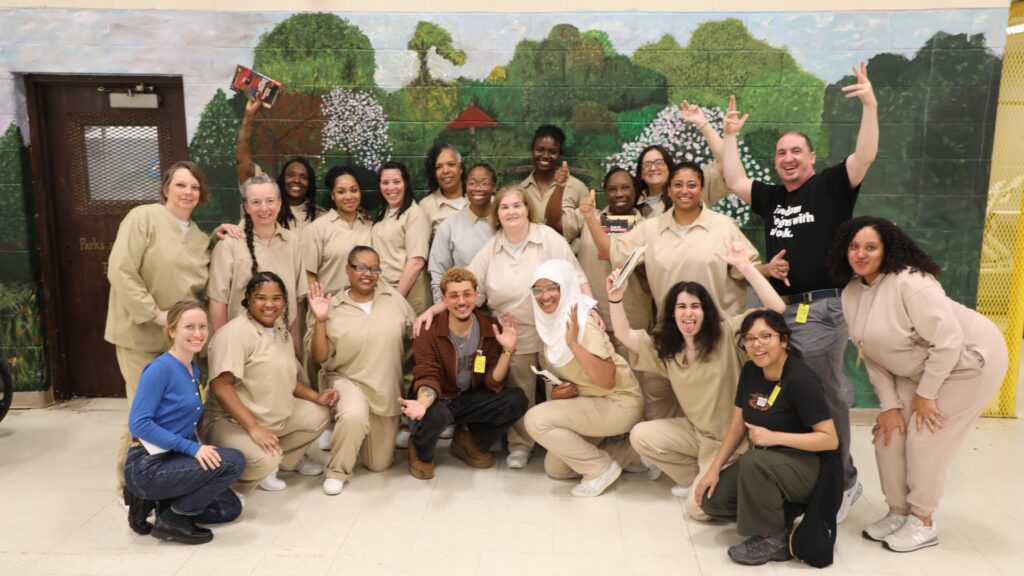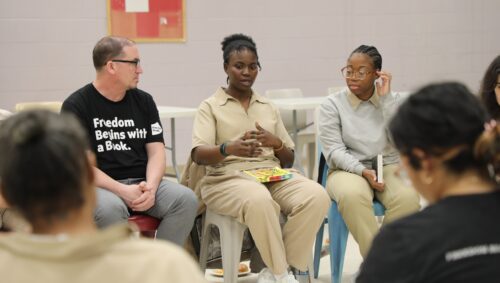In New Jersey’s Edna Mahan Correctional Facility, a group of sixteen women gathered to discuss four shortlisted books for the Inside Literary Prize—the first book award in the US judged exclusively by incarcerated readers.
By Catriona Ting-Morton, Senior Communications Manager
Before May 15 of this year, I’d never been inside a prison before. That’s a privilege in this nation, where the criminal legal system holds nearly 2 million people, where one in seven adults has had an immediate family member incarcerated for more than a year, and one in 34 has had a loved one incarcerated for 10 years or more.
On a foggy morning in mid-May, the streets of midtown Manhattan occupied only by bleary eyed early-morning workers gripping their coffees, a small team of us from the Center for Justice Innovation set off to Edna Mahan Correctional Facility in New Jersey to film a special documentary video. A group of sixteen women waited patiently for us there, ready to start their long-awaited judging session for the Inside Literary Prize—the first book award in the US to be judged exclusively by people who are currently incarcerated.
When we arrived in the parking lot, I was struck by the razor wire fences that surrounded the facility. But I would soon learn just how little these fences “determine the worth of a person’s insights or experiences,” as the brilliant Steven Parkhurst—communications manager at Freedom Reads, our partner in the Inside Literary Prize—recently wrote.
After around thirty minutes of security checks, we made it through to a large recreational room where we were greeted by a group of women sitting anxiously and excitedly in a circle. They each sat with the stack of four shortlisted books—This Other Eden by Paul Harding, Chain-Gang All-Stars by Nana Kwame Adjei-Brenyah, Blackouts by Justin Torres, and On a Woman’s Madness by Astrid Roemer—perched on their laps as our partners at Freedom Reads began to facilitate the judging process.
The judges explored each of the books deeply in the course of the session, drawing out through lines of trauma, colonialism, oppression, patriarchy, and queerness within each of the titles. They discussed how some of the books made them reflect on what it’s been like to find some of their own kin on the inside and how their community helps them feel truly understood.
The discussion also turned to broader questions about access and censorship, with one judge expressing that she wished the books had been offered in Spanish, her first language. One of the books, Blackouts by Justin Torres, led to rich and respectful debates about the realities of censorship in prison. All books entering prisons across the country must be approved by their state’s Department of Corrections, so to allow equal access to all the shortlisted books, a special Freedom Reads edition of Blackouts was published for Inside Literary Prize judges which omitted certain images deemed inappropriate for the Inside readers. Some readers understandably felt angry at what they saw as a further limitation of their freedoms. Others, however, saw a poetic aspect to it, due to Torres’s intentional choice to censor other images in the book to show how censorship has always taken place in the contexts of sexuality, race, class, and incarceration.
The session concluded with the judges voting on who they thought deserved to win the 2025 Inside Literary Prize. The judges were reminded that this was not about which one was their personal favorite, but instead which one they believed needed to be read by others. Afterwards, the circle was transformed into rows in preparation for an author reading from Reginald Dwayne Betts, founder and CEO of Freedom Reads, and we were lucky enough to share lunch with the judges. Over lunch, we interviewed a selection of women about what it’s been like to be a part of the Inside Literary Prize, what books mean to them as readers, and which book they think deserves to win.

More women joined from the facility to hear Betts read from his newest poetry collection, Doggerel. I watched the crowd as Betts read poems about freedom, love, masculinity, and his own experience being formerly incarcerated, and saw dozens of faces enthralled by his evocative and moving performance. It made clear that literature can transcend any space; even as we all sat within the walls of the facility, we were exploring the world together through Betts’s mastery of language.
And then, just as suddenly as we were all transported, our time inside was over. The tables and chairs were packed away. Women filed out of the large room in different directions. We got to say goodbye to some—the woman with whom I had a long conversation about Naomi Klein’s Doppelgangers, the woman who reminded us all how every book we were discussing that day tied back to colonial legacies we were all still living within, the librarian who spoke beautifully about accountability and how On a Woman’s Madness spoke to her experience as a South Asian woman. But there were others we didn’t get to say goodbye to, who I wish I’d gotten to thank again for their insight and attention to the power of words and stories.
